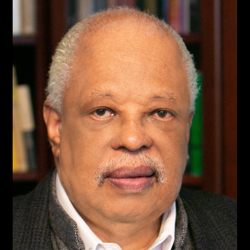Bobby Austin is the General Hal Moore Chair in Contemplative Leadership at the Thomas Merton Institute and is the Chairman of the Planning Committee on the Status of African American Men, convened by Congressman Danny Davis (D), Ill. He organized the civil society People Assembly in D.C. for the People Programme.Dr. Austin recently served as the Vice President for Student Affairs at the University of the District of Columbia. Dr. Austin is a founding fellow of the National Endowment for Public Trust and Director of its Justice Task Force. His former positions include founding President of the Village Foundation and Executive Director of the National Task Force on African-American Men and Boys, which released the groundbreaking report, Repairing the Breach: Key Ways to Support Family Life, Reclaim Our Streets and Rebuild Civil Society in America’s Communities. Dr. Austin has also held positions with the W.K. Kellogg Foundation, including Director of the African-American Men and Boys Initiative and Assistant Director of the Kellogg National Fellowship Program. Dr. Austin was the founding editor of the Urban League Review, the national research and policy journal of the National Urban League.
Dr. Austin earned a bachelor’s degree in economics and sociology from Western Kentucky University in Bowling Green, Kentucky and a master’s degree in sociology from McMaster University in Hamilton, Ontario, Canada. He also has received a diploma from the Graduate School of Education at Harvard University and an honorary doctorate from Central Michigan University.
Dr. Austin has a large number of monographs, articles and artistic works to his credit. His most recent books are Circus Clowns and Carnival Animals: Growing Up in the Ebb and Flow of Rural Black Life (Cold Tress Press 2008) and Wake Up and Start to Live: an Analysis of a Gallup Poll and a Statistical Profile of African American Men, 1990-2000, with Joseph McCormick and Brian Gilmore (University Press of America 2003). He is author of “What a Piece of Work Is Man“, a monograph published by W.K. Kellogg Foundation in 1992. His articles include, “Twenty-First Century Leadership in the African American Community,” with United Nations Ambassador, Andrew Young, in The Community of the Future, edited by Frances Hesselbein, Marshall Goldsmith, Richard Beskhard, and Richard F. Schubert (The Drucker Foundation 1998) and “Towards a Theory of Cultural Leadership” in Concepts, Challenges, and Realities of Leadership: An International Perspective. Selected Proceedings from the Salzburg Seminar on International Leadership, edited by James MacGregor Burns, Georgia Sorenson, and Larraine Matusak.
He has been a partner with Austin Ford Associates, a Washington, DC-based consulting firm, an Executive Assistant to the President of the University of the District of Columbia (UDC), and an Assistant to the UDC Board of Trustees and the late Ronald H. Brown. Dr. Austin has served as a speech writer and issues director for former Housing and Urban Development Secretary, Patricia Roberts Harris, as well as the former Mayor of Washington, D.C., Sharon Pratt Kelly. He also served as Special Consultant on American Culture to the Joseph Duffey at the National Endowment for the Humanities and as Staff Director and Research Coordinator for the District of Columbia Statehood Constitutional Convention.
Dr. Austin serves as a board member for The National Housing Trust and the National Institute for Urban Wildlife. He has served on the boards of the Council for the Advancement of Adult Literacy, Citizenship Counts, and Alpha Phi Alpha, Inc, and has served as co-convener of the Secretariat for African American Civil Society Leaders and Co-Convener of the United States Assembly. He previously served on the boards of the D.C. Repertory Theater and The Capital Ballet of Washington, D.C. He has served as an appointed member of the Atlantic Council of the United States, and a member of the Academic Council on the United Nations System, the Global Education Association, the American Culture Association, and the American Sociological Association.

